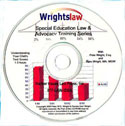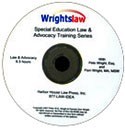Directions
You will receive an email with the correct answers. Good luck!
1. ________Disability category under IDEA; includes disorders that affect the ability to understand or use spoken or written language; may manifest in difficulties with listening, thinking, speaking, reading, writing, spelling, and doing mathematical calculations; includes minimal brain dysfunction, dyslexia, and developmental aphasia
2. ________ Usually means an alternative to a paper and pencil test; refers to non-conventional methods of assessing achievement (e.g., work samples and portfolios).
3. ________ A distribution of scores used to scale a test. It is a normal distribution curve with most scores in the middles and a small number of scores at the law and high ends.
4. ________ If child with disability engages in behavior or breaks a rule or code of conduct that applies to nondisabled children and the school proposes to remove the child, the school must hold a hearing to determine if the child’s behavior was caused by the disability.
5. ________ Changes in how test is administered that do not substantially alter what the test measures; includes changes in presentation format, response format, test setting or test timing. They are made to level the playing field, i.e., to provide equal opportunity to demonstrate knowledge.
6. ________ Disability category under IDEA; includes depression, fears, schizophrenia; adversely affects educational performance.
7. ________ Requirement that schools provide full easily understood explanation of procedural safeguards that describe parent’s right to an independent educational evaluation, to examine records, to request mediation and due process.
8. ________ Procedural safeguard to resolve disputes between parents and schools; must be voluntary, cannot be used to deny or delay right to a due process hearing; must be conducted by a qualified and impartial person who is trained in effective techniques.
9. ________ Requirement to educate special needs children with children who are not disabled to the maximum extent possible.
10. _______ Changes in the content, format, and/or administration of a test to accommodate test takers who are unable to take the test under standard test conditions. These alter what the test is designed to measure or the comparability of scores.
11. _______ Expectations about what the child should know and be able to do in different subjects and grade levels; defines expected student skills and knowledge and what schools should teach.
12. _______ The practice of combining two or more subtest scores to create an average or composite score. For example, a reading performance score may be an average of vocabulary and reading comprehension subtest scores.
13. _______ The middle score in a distribution or set of ranked scores; the point (score) that divides a group into two equal parts; the 50th percentile. Half the scores are below this, and half are above it.
Need more review? Refer to the Glossary of Special Education and Legal Terms and the Glossary of Assessment Terms.
You will find both glossaries of terms in these Wrightslaw books:

 Special Education Law, 2nd Edition Special Education Law, 2nd Edition
and
From Emotions to Advocacy |








